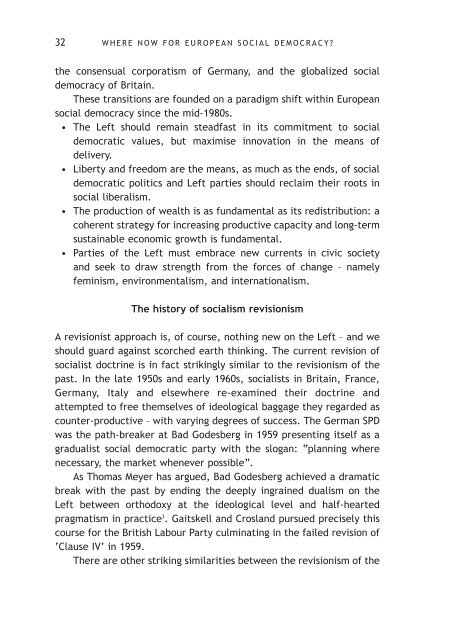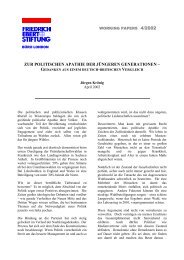Where Now for European Social Democracy? - Policy Network
Where Now for European Social Democracy? - Policy Network
Where Now for European Social Democracy? - Policy Network
Create successful ePaper yourself
Turn your PDF publications into a flip-book with our unique Google optimized e-Paper software.
32WHERE NOW FOR EUROPEAN SOCIAL DEMOCRACY?the consensual corporatism of Germany, and the globalized socialdemocracy of Britain.These transitions are founded on a paradigm shift within <strong>European</strong>social democracy since the mid-1980s.• The Left should remain steadfast in its commitment to socialdemocratic values, but maximise innovation in the means ofdelivery.• Liberty and freedom are the means, as much as the ends, of socialdemocratic politics and Left parties should reclaim their roots insocial liberalism.• The production of wealth is as fundamental as its redistribution: acoherent strategy <strong>for</strong> increasing productive capacity and long-termsustainable economic growth is fundamental.• Parties of the Left must embrace new currents in civic societyand seek to draw strength from the <strong>for</strong>ces of change – namelyfeminism, environmentalism, and internationalism.The history of socialism revisionismA revisionist approach is, of course, nothing new on the Left – and weshould guard against scorched earth thinking. The current revision ofsocialist doctrine is in fact strikingly similar to the revisionism of thepast. In the late 1950s and early 1960s, socialists in Britain, France,Germany, Italy and elsewhere re-examined their doctrine andattempted to free themselves of ideological baggage they regarded ascounter-productive – with varying degrees of success. The German SPDwas the path-breaker at Bad Godesberg in 1959 presenting itself as agradualist social democratic party with the slogan: “planning wherenecessary, the market whenever possible”.As Thomas Meyer has argued, Bad Godesberg achieved a dramaticbreak with the past by ending the deeply ingrained dualism on theLeft between orthodoxy at the ideological level and half-heartedpragmatism in practice 3 . Gaitskell and Crosland pursued precisely thiscourse <strong>for</strong> the British Labour Party culminating in the failed revision of‘Clause IV’ in 1959.There are other striking similarities between the revisionism of the



